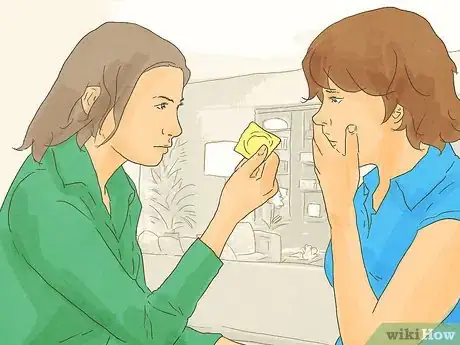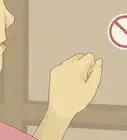This article was co-authored by Paul Chernyak, LPC and by wikiHow staff writer, Christopher M. Osborne, PhD. Paul Chernyak is a Licensed Professional Counselor in Chicago. He graduated from the American School of Professional Psychology in 2011.
This article has been viewed 69,680 times.
With the advances in technology and media, teenagers are bombarded with sexual content and may be more inclined to engage in sexual activity. This, combined with their typical privacy and moodiness, makes it difficult as a parent to know whether your teen is having sex. To find the answer, you can ask them about their sexual behavior, recognize signs of sexual activity, and be more involved in their life on a regular basis.
Steps
Asking Teens About Their Sexual Behavior
-
1Consider your reason for asking. Taking a moment to think about the reason why you want to ask your teen about their sexual behavior before you do so can help you to have a productive conversation with them. Ask yourself questions like:
- “What is my purpose for asking them about their sexual behavior?”
- “Am I concerned about them?”
- “Am I trying to educate them?
-
2Practice what you’ll say. Talking to your teen about sex might not be one of your favorite activities. You might be nervous or worried about asking your teenager about their sexual activity. If you go over what you want to say, it can make it easier for you to talk to them and also find out if they’re having sex.
- You can write down what you want to say ahead of time and read through it, practice in front of a mirror, or role play with another parent or friend.
- Consider working in a bit of humor to face the awkwardness head-on: "I'm sure you'll be as excited about this as I am, but it's time for us to talk about S-E-X."[1]
-
3Ask them directly. This is a good way to ask your teenager about their sexual behavior if you know your teen will be honest with you. Being direct about it will let you know whether your teen is having sex quicker than any other way.[2] It will also show your teen that you think they’re honest and mature enough for you to ask them directly about such a serious topic.
- For example, you might skip the speeches and jokes and simply ask your son, “Tez, have you started having sex?”
-
4Ask about their friends' sexual activity. If you don’t think your teen is going to be honest with you if you ask them about having sex, you still have options. One alternative is to indirectly ask your teen about their sexual activity by talking about what their peers are doing.[3]
- For example, you might say, “Are any of your friends having sex? What’s their opinion about sex?”
- If the conversation is going well, you may want to ask for their opinions about sex, share some of your own views and experiences, and then ask about their personal sexual activity.
-
5Ask someone else to talk to your teen. If you aren't comfortable talking to your teenager about sex, that doesn’t mean you shouldn’t try to find out if they’re having sex. If you need to, ask someone that you and your teen trust and respect, such as an older sibling or close family friend.
- Try if at all possible not to violate your teen's trust by asking this third person to "spill the beans" on the discussion without your teen's knowledge. Be clear from the start that what they discuss will be shared. Or, better yet, engage in the conversation all together.
-
6Be prepared for their answer. Whether your teen is honest with you or not or whether they are having sex or not, you have to be able to accept the answer. Remain calm while you’re talking to your teenager and accept whatever response they give.[4]
- For example, if your teen tells you that they are having sex, don’t get angry. Stay calm and let them know you accept their answer even if you don’t like it.
- Or, if they say they don’t want to talk about it, avoid getting angry. Instead, revisit the talk at another time.
- Even if your teen does not give you an answer, be willing to accept that. Depending on your relationship with them, they might not feel comfortable talking with you about this subject.
Recognizing Signs of Sexual Activity
-
1Look for the obvious. While not all signs of sexual activity are obvious, there are some signs and clues that should leave no doubt that your teenager is having sex. Don’t overlook the obvious hints, instead trust what you see and what your instincts tell you.
- For example, if you find a used condom wrapper, pack of birth control pills, or pregnancy test among your teen's dirty clothes and clutter, it’s most likely a sign that they're having sex.
-
2Examine social media. The numerous and various apps and social networking sites available today give teenagers more access to sexual content. It also makes it easier, and sometimes seems to encourage them, to share personal information about their sex lives. While you may not want your teen sharing sensitive and potentially damaging information through text, posts, or emails, examining these outlets can give you an indication of what your teen is doing.[5]
- You don’t have to become an internet troll or break into their electronic devices, but you should regularly review what they're posting to see if anything is inappropriate or gives you a hint about their sexual activity.
- You should also be on the lookout for sexts (sexual texts) to and from your teen. These may include sexual text messages with or without images included.
-
3Watch for changes in behavior. Teens will be moody and temperamental whether they're having sex or not, but changes in typical attitudes and behaviors might indicate that they've become sexually active. Do they seem more secretive, or unwilling to share where they're going or who they're hanging out with? These aren't sure signs of sexual activity, but they might raise red flags.
- Keep an eye out for indications of unusually obsessive or aggressive behaviors related to sex, or signs that sex is viewed as a means of validation or building self-esteem. These could point to a more significant mental health issue that should be medically addressed.[6]
- Be aware that how your teen dresses may also indicate that they are thinking about sex. For example, if your teen dresses provocatively, then they may be considering sex. (However, this is not a surefire sign.)
-
4Do not accuse your teen of anything. Accusing your teen of doing something that you find inappropriate will only make matters worse. By accusing your teen, the may be unwilling to talk with you or confide in you in the future. They may also feel like you are judging them. Even if you have strong suspicions, do not accuse your teen of anything.
Being Involved in Their Life on a Regular Basis
-
1Talk to them every day. The best way to stay actively involved in your teenager's life is to keep the lines of communication open. Although teens are notorious for being hard to talk to, you should still make the effort. Knowing that you are available and willing to talk can make it easier for your teen to talk to about sex and for you to tell if they’re having sex.
- Talk about everyday things like social issues, their day, their friends, and anything else that they’ll discuss.
- You should also talk about serious issues such as drugs, alcohol, and sex on a regular basis so that you’re both comfortable talking about it.
-
2Know their friends and partners. Teenagers generally have friends and partners that reflect their morals and values, and have similar opinions. Getting to know the people in your teen's life can help you learn a great deal about their sexual activity. The more you know about the people your teenager chooses to have in their life, the more you will be able to tell about your teen and the types of things they might be doing, including sex. [7]
- For example, if most of your teen daughter’s friends seem very into dating, romance, and intimacy, it’s likely your daughter is also.
- Encourage your teenager to invite their friends over. You don’t have to stay in the room with them the whole time, but just them being there can give you a sense of them.
-
3Support their interests. When you show an interest in the things they enjoy and participate in, it lets your teen know that you care. This is one way to build a strong bond with your teenager so that you’ll both feel comfortable talking about sex.[8]
- Ask your teen what their interests and hobbies are if you don’t already know.
- Attend recitals, practices, games, etc. as much as you can.
References
- ↑ https://www.psychologytoday.com/blog/teen-angst/201009/is-your-teen-having-sex
- ↑ https://www.healthychildren.org/English/ages-stages/gradeschool/puberty/Pages/Talking-to-Your-Child-About-Sex.aspx
- ↑ http://www.parents.com/parenting/better-parenting/teenagers/is-my-child-having-sex/
- ↑ https://www.healthychildren.org/English/ages-stages/gradeschool/puberty/Pages/Talking-to-Your-Child-About-Sex.aspx
- ↑ http://kidshealth.org/en/parents/2011-sexting.html?ref=search
- ↑ https://childmind.org/article/when-to-worry-about-your-kid-having-sex/
- ↑ http://www.ahaparenting.com/Ages-stages/teenagers/parent-teen-relationship
- ↑ http://www.ahaparenting.com/Ages-stages/teenagers/parent-teen-relationship
About This Article
The easiest way to tell if your teen is having sex is to look for obvious signs of activity like used condom wrappers, birth control pills, and pregnancy tests. If you can't find any concrete evidence, examine their social media content to see if they are posting anything inappropriate that might give you a hint about their sexual activity. Also, get permission to monitor your teen’s phone so you can look for sexts or inappropriate images. No matter how you feel about your teen's actions, try to have an honest and compassionate conversation about sex instead of accusing them, since blame might make them lie or lash out. For more advice from our Counselor co-author, like how to directly ask your teen about their sexual activity, read on.




















-Step-19-Version-3.webp)






















































Medical Disclaimer
The content of this article is not intended to be a substitute for professional medical advice, examination, diagnosis, or treatment. You should always contact your doctor or other qualified healthcare professional before starting, changing, or stopping any kind of health treatment.
Read More...